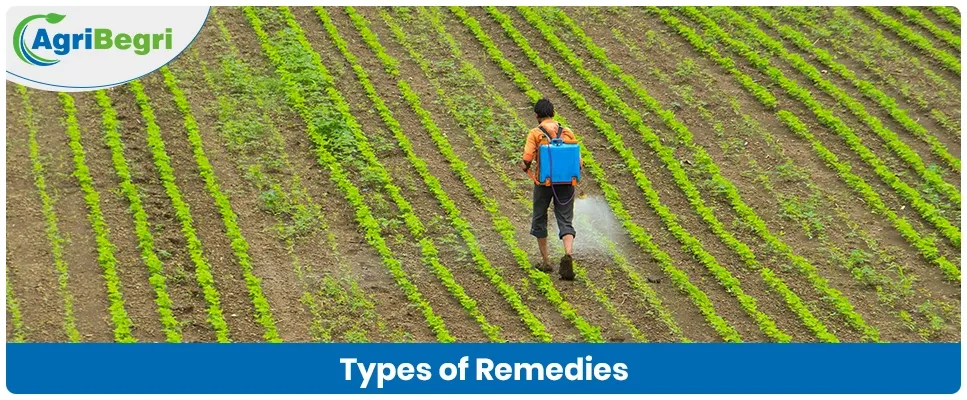Introduction:
Every farmer faces challenges in the crop development process. There are problems like insects eating, budding crops and fungal infections damaging the leaves. Weeds that grow faster than the main crop, using up all the vital nutrition can also be a huge challenge. These issues reduce crop yield and put months of hard work to waste.
In the farming context, “remedies” refer to solutions and treatments used to protect crops and enhance soil quality. The powders, sprays, and even natural mixtures can be described as remedies. These treatments help control pests, weed growth, and diseases.
Through this blog, we will understand the various types of remedies used in today’s farming along with their effects. These remedies are the solutions that we can regularly use in our crop production process.
Understanding Remedies in Farming
Remedies in farming are methods or treatments that make our soil healthier and protect our crops. The remedies can be synthetic or natural, like neem and soil-friendly bacteria.
Some of these remedies boost plant growth, while others control pests and unwanted weeds. All of these solutions have evolved with the changing farming methods from ancient to modern times.
Think of remedies as the crop’s support system. We humans need medicine when we are sick. Similarly, our crops, too, need help to stay strong and healthy. The two primary purposes of these remedies are to protect our harvest and to improve our soil.


Why Are Remedies Essential in Modern Farming?
In today’s time, farming is not easy. Weather and climate change, soil fatigue, and stronger pests make it harder to grow healthy and profitable crops. Farming remedies are essential in reducing crop loss and protecting plants during critical growth and harvest stages. They also manage seasonal attacks, such as thrips, blight, and wilting. Here are a few of the most common issues faced in modern-day farming:
- Pests developing resistance to older treatments.
- Some diseases spread rapidly due to changes in moisture or temperature.
- Weeds compete with valuable crops for water and sunlight.
- Poor soil health reduces plant strength and quality.
Farming remedies counter these issues, giving our crops a better chance to survive. Some modern remedies have also evolved to save time and effort. Instead of manually picking off insects or hand-removing weeds, we can treat large areas quickly and effectively. When used correctly, they reduce crop loss, improve soil quality, and increase our income.
Major Types of Remedies Used in Farming Today
Insecticides:
Insecticides kill harmful insects that damage the crop. These pests include insects such as aphids, caterpillars, and beetles.
There are two main types of Insecticides:
- Contact Insecticides: These chemicals kill insects upon interaction with the insect's body surface.
- Systemic Insecticides: These insecticides enter the plant and kill insects that feed on it.
Farmers often use insecticides on crops such as cotton, brinjal, cabbage, and paddy. Spraying at the right stage (usually during the early appearance of pests) provides the best results. Following the correct dosage and expert guidance helps control harmful insects without harming crops.
Fungicides:
Fungicides are chemicals that protect crops from fungal diseases and water molds, such as rust, leaf spot, and powdery mildew.
These diseases are quick to spread, particularly in humid and rainy weather conditions. Crops like tomatoes, bananas, groundnuts, and wheat often face similar infections.
There are two main types of Fungicides:
- Preventive Fungicides: Applied before the disease appears.
- Curative Fungicides: Used when the symptoms are visible.
Fungicides help improve overall plant health and reduce leaf damage. Regular monitoring is needed for practical use. For example, in many north Indian states, it is commonly seen that the wheat crop is affected by yellow rust and leaf blight. Yellow rust, first detected in India in 2013–2014, can potentially reduce wheat yields by up to 70%. Preventive fungicides are used here at the early signs of rust, especially during cold and humid winters.
Weedicides (Herbicides)
Weedicides, also known as Herbicides, are sprays used to control unwanted plants (weeds). These weeds grow with crops and consume water and essential nutrients. This results in weak or deformed crops.
We should use herbicides before the sowing stage or after germination in crops such as rice, maize, sugarcane and soybeans. Here are some of the Weedicide types:
- Selective: They target only weeds and are safer for the crop.
- Non-selective: They kill all plants in the area and are used before sowing.
Weedicides help the plants during early stages of growth. They reduce the need for manual hand-picked weeding and increase overall productivity. Careful application is required to prevent damage to nearby crops.
Biopesticides & Organic Remedies
These are natural remedies extracted from fungi, bacteria or plants, such as neem. Being eco-friendly, these remedies leave lesser residue on the soil and crops.
These biopesticides are mainly used for vegetable, fruit and other organic cultivation. They help in long-term crop and soil protection. These organic remedies may act more slowly than chemical remedies, but they are safer for the environment, soil health, and quality. According to studies, these natural farming remedies also benefit crop-friendly insects and farmers.
Soil Conditioners & Growth Regulators
These remedies boost soil quality and plant performance.
A few examples of Growth Regulators are Seaweed extract, Potassium Humate and Micronutrient mixes. The seaweed extract is made of Kelp, Bladderwrack and Ascophyllum. It is commonly available in the form of powder, granules and meals. Potassium Humate, while being available in granular and powder form, is also available as liquid. Lastly, Micronutrient mixes are composed of essential minerals like zinc, boron, iron, etc.
These soil conditioners enhance flowering, strengthen roots, and promote better nutrient absorption. Crops such as bananas and tomatoes greatly benefit from these growth regulators when applied during the flowering stage.
These remedies make plants stronger and increase yields. When the soil quality is poor, these organic remedies also help repair and restore the soil’s health.
Benefits of Using the Right Remedies in Farming
Applying the proper remedy at the right time can make a big difference in our farm’s produce. Mentioned below are the benefits of the correct application:
Main Benefits:
- It helps fight weeds, diseases, and pests early, before the damage
- Reduces the need for manual, hand-picked labor methods
- Improves the soil condition and plant health
- Increases quality and quantity of the produce
- Prevents sudden attacks that lead to crop failure
- It makes farming less risky, more controlled, and more predictable
Even a fundamental change, such as applying a growth regulator during the flowering period, can lead to improved fruit yield. Not only that, but these remedies also save time during the peak seasons when labor is short and expensive.
Are These Remedies Safe for Soil, Crops, and Health?
Like many farmers, you may wonder, “Are these remedies harmful?”
The answer is simple. When used properly, most farming remedies are both safe and effective. The key lies in applying the right treatment, in the correct dose, and at the right time. When handled properly, these remedies not only protect crops but also keep the soil healthy and safe for everyone.
Here are a few safety tips and examples of correct usage:
- Always follow the instructions on the label during the application
- Wearing protective clothing and gear during spraying is recommended
- Use trained or experienced people while using chemical remedies
- Avoid spraying in windy conditions or near sensitive crops
- Avoid spraying too close to the main crop. It may harm both (the weed & main crop)
- Moderate usage of insecticides saves good insects like honeybees & dung beetles
Biopesticides and organic remedies are usually safer for edible vegetables and fruits. But even their application needs proper timing and care.
Final Thoughts for Indian Farmers
Every farm is unique and different. The same remedy may not work for all soil types, crop species, and geographical locations.
Before using any new remedy, it is advisable to seek guidance from a crop remedy expert or experienced farmers. Every crop deserves the right care. Using suitable remedies at the right time gives plants the best chance to grow stronger and deliver higher yields.













